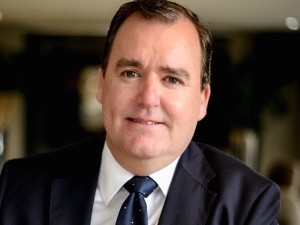Johannesburg, 11 May 2017

Water is a vital resource that is under threat, both locally and across the world, and the global water crisis promises to revolutionise the way in which water is measured, controlled and billed, says Greg Morris, CEO, MMG Holdings.
At home, drought has a severe effect on South Africa's agricultural productivity, negatively affecting our GDP. Neither small businesses nor international companies can function without it, threatening industrial growth. Plus, the water crisis impacts other areas of our lives, like sanitation and food security, and unreliable access can be fatal for rural communities.
Is the Vaal Dam crisis over?
Although the Vaal Dam's levels are at a two-year high, this is not the end of the drought or water restrictions. Smaller dams in the region have not filled, while other parts of South Africa, like Cape Town, face the stark reality that within a matter of 100 days, they may not have water at all. In KZN, water restrictions have been in force for some time, and show little sign of abating.
Peter Rodseth, Managing Director of Utility Systems, an MMG subsidiary, says that the focus needs to move from crisis to the implementation of proactive water-saving technologies. The water shortage issue, by virtue of SA's burgeoning population, will be an ongoing problem.
What causes the problems?
Infrastructure, reticulation and bulk meters have not been maintained over the last 25 years. There are many leaks and a massive amount of water being wasted. In fact, Rodseth says that, "more than 30% of water earmarked for domestic consumption is lost through leaks [both in consumer properties and in the municipal reticulation], exacerbating the water shortage."
This problem is compounded by the need to shut down water to certain areas. When this happens, the bulk meters are re-opened and the resultant water hammer from air rushing through the pipes causes them to rupture. More water and money is wasted in this way.
Municipalities are in a compromised position, because they can't know with any accuracy how much water is going where. Balancing is inaccurate and revenue is lost without explanation. Failure to implement appropriate metering and billing systems contributes to a worsening crisis.
Is there a way out for us?
There are solutions to the water crisis, but only if water service providers are driven to pay more attention to non-revenue water and the conservation of water, ongoing community consultation and education, up-skilling municipalities, and proper after-sales service.
Technology, like smart metering systems, has the potential to win the fight to reduce water consumption and improve revenue collection. Smart meters can detect leaks and tampering and monitor water in almost real time, while it can take a consumer up to four months to detect leaks. With control of their water, consumers can manage consumption and identify waste.
Consider, says Darren Oxlee, Chief Technical Officer at Utility Systems, a smart water supply system fitted with sensors to measure water pressure, chemical composition, and flow. When undesirable changes occur, authorities can take immediate corrective measures.
Municipalities need to be able to collect revenue efficiently, to enhance profitability and deliver services. Forward-thinking municipalities are already implementing smart metering, but infrastructure, reticulation and bulk meters must also be upgraded for viable results.
Due to the diversity of SA's socio-economic and natural environment, we must, says Rodseth, challenge the idea that there is one solution to the needs of all consumers: "We need a customisable, adaptable product, like Utility Systems Water Management Device (WMD)."
Utility Systems offers a variety of smart water technology solutions, which include management of free basic water supply, Standard Transfer Specification (STS)-based prepayment, automated meter reading, advanced metering infrastructure, and bulk water management.
What's the role of a smart city?
It's widely agreed that cities need to become 'smarter'. The creation of smart cities is a focus in many countries, which have urban development visions of managing their cities' assets by integrating Information and Communication Technology (ICT) and the Internet of things (IOT).
To become 'smart', local and provincial governments have to find practical answers to the water problem. In the water sector, the international trend is to leverage these technologies.
(Several of the MMG group companies are involved in delivering products and services that are used in smart cities. These include Sebata Municipal Solutions, NOSA, Freshmark Systems, Utility Systems, Amanzi Meters, Mubesko Africa, R-Data, Turrito and Cloud Ware.)
And what's the bottom line?
In conclusion, while there is a common understanding that access to water is a basic human right, this right comes with a strong responsibility to research, understand, implement, and then safeguard the systems that can provide sustainable access to this scarce resource.
About the author:
Greg Morris, CEO, MICROmega Holdings Limited
Greg Morris is the Chief Executive Officer of MICROmega Holdings Limited. Greg joined the group in 2000 and was appointed CEO in January 2011. Responsible for the day-to-day operations, management and corporate finance transactions of the Group, Greg holds a Bachelor of Accounting Honours Degree and is a qualified Chartered Accountant.
Share